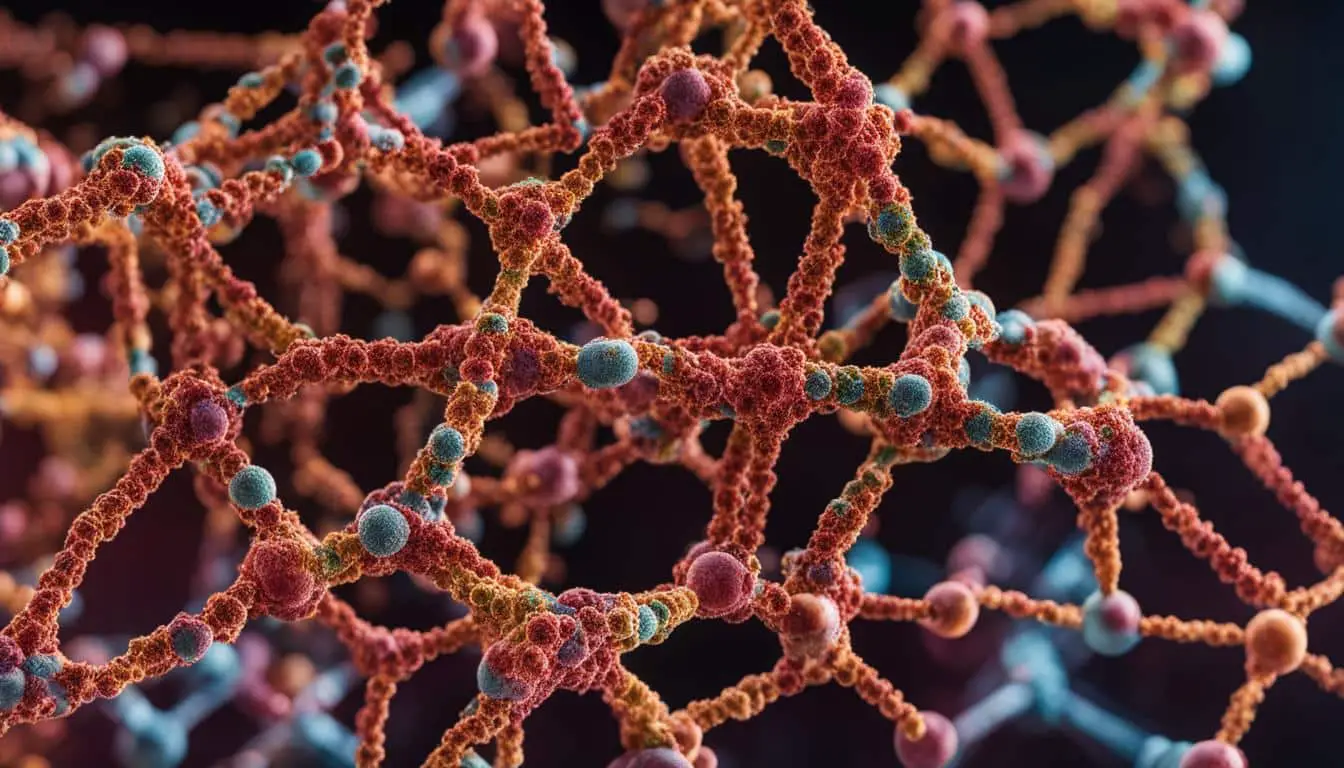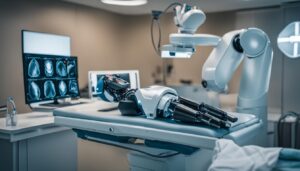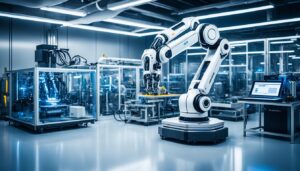
As a professional in the field of pharmaceutical research, I am constantly amazed by the transformative power of artificial intelligence (AI) in accelerating drug discovery and development. AI technology has rapidly evolved, enabling researchers to revolutionize the way we approach drug research and create valuable contributions to the pharmaceutical sector.
Through the integration of AI technology, pharmaceutical researchers can now expedite the process of discovering and developing new drugs. AI algorithms can analyze vast amounts of data, identify patterns, and make predictions, providing invaluable insights that can significantly streamline research efforts.
In this article, I will delve into the various ways in which AI is transforming pharmaceutical research and its profound impact on drug development. From extracting meaningful information from images to enhancing automated algorithms and streamlining clinical trial procedures, AI has become an indispensable tool in our quest for innovative treatments.
Key Takeaways:
- AI technology has revolutionized drug discovery and development in the pharmaceutical sector.
- AI algorithms can analyze data, identify patterns, and provide valuable insights, expediting the research process.
- AI extracts meaningful information from images, enhancing understanding and analysis in drug discovery.
- Automated algorithms benefit from AI integration, improving their performance in interpreting visual and language-based information.
- AI streamlines clinical trial procedures, automating manual tasks and improving data quality.
The Power of AI in Extracting Information from Images
One crucial aspect of AI drug discovery is its ability to extract meaningful information from images. By harnessing the power of computer vision algorithms, machine learning, and neural networks, AI enables machines to analyze and understand visual data, revolutionizing the field of computer vision.
Computer vision algorithms, inspired by the functioning of the human visual system, allow machines to recognize and interpret objects, scenes, and patterns within images. Through the process of deep learning, AI models can identify and classify these visual elements, paving the way for groundbreaking discoveries in drug development.
Neural networks, a core component of AI, play a pivotal role in the extraction of information from images. These networks consist of interconnected layers of artificial neurons that are capable of learning and making complex decisions based on patterns observed in vast amounts of image data. By training these neural networks on labeled images, AI systems can accurately identify and categorize objects of interest.
- AI in computer vision: By leveraging AI in computer vision, researchers can overcome the limitations of traditional methods and achieve unprecedented accuracy and efficiency in extracting information from images.
- Extracting information from images: With the aid of AI, machines can sift through vast image datasets, extracting relevant information and uncovering hidden insights that may elude human observation alone.
- Machine learning: AI algorithms, utilizing machine learning techniques, can continually improve their ability to extract information from images over time, enhancing their accuracy and applicability in drug discovery.
- Neural networks: The integration of neural networks enables AI systems to learn from massive amounts of visual data and extract meaningful information from images, optimizing the drug discovery and development processes.
The synergistic combination of AI, machine learning, and computer vision has propelled the field of drug discovery forward, fueling advancements that were previously unimaginable. With AI’s ability to accurately analyze and interpret visual data, scientists are now able to gain deeper insights into complex biological processes, identify potential drug candidates, and accelerate the development of life-saving medications.
Enhancing Automated Algorithms through AI Integration
Automated algorithms play a critical role in the field of drug discovery, enabling researchers to process vast amounts of data efficiently. However, these algorithms face challenges in accurately interpreting visual information and natural language. The integration of artificial intelligence (AI) has paved the way for significant advancements in this area, addressing these challenges and enhancing the capabilities of automated algorithms.
One of the key ways AI is improving automated algorithms is through the use of natural language processing. By incorporating AI-powered models, algorithms can better understand and analyze language descriptions related to drug discovery. This capability allows algorithms to extract relevant information and insights from text-based sources such as scientific papers, clinical trial data, and medical records.
“The ability of AI algorithms to process and comprehend natural language opens up a wealth of opportunities for drug discovery research.”
In addition to natural language processing, AI integration also leverages visual examples to train automated algorithms effectively. Visual data, such as molecular structures, cellular images, and chemical reactions, can be challenging for traditional algorithms to interpret accurately. However, by fine-tuning neural network models and coupling visual examples with natural language descriptions, AI algorithms can enhance their performance and assist in various drug discovery tasks.
Benefits of AI Integration in Automated Algorithms
The integration of AI technology in automated algorithms offers several benefits in the field of drug discovery:
- Improved accuracy: AI algorithms can better interpret visual information and natural language, reducing errors in data processing.
- Faster insights: By training algorithms with visual examples and language descriptions, AI integration accelerates the generation of meaningful insights.
- Efficient decision-making: AI-powered algorithms provide researchers with more precise and reliable information, enabling them to make informed decisions at every stage of drug discovery.
Overall, AI integration enhances the capabilities of automated algorithms, enabling them to overcome challenges in interpreting visual and textual data. Through natural language processing and the incorporation of visual examples, AI algorithms contribute to more accurate and efficient drug discovery processes.
| Challenges | Solutions |
|---|---|
| Interpreting complex visual data | Fine-tuning neural network models and coupling visual examples with natural language descriptions |
| Processing and analyzing large volumes of natural language text | Integration of AI-powered models for advanced natural language processing |
| Ensuring accuracy and reducing errors in algorithms | AI algorithms offer improved accuracy in interpreting visual and textual data, reducing errors in data processing |

The integration of AI technology in automated algorithms demonstrates its tremendous potential in advancing drug discovery. By overcoming challenges in interpreting visual information and natural language, AI algorithms contribute to more accurate analyses and faster insights. As AI continues to evolve, it promises to further enhance the capabilities of automated algorithms and propel the field of drug discovery forward.
AI’s Impact on Clinical Trial Procedures
AI has revolutionized clinical trial procedures by harnessing the power of automation technology. By streamlining trial procedures and improving data quality, AI is playing a significant role in expediting the development and delivery of effective treatments and cures to patients.
One notable example is Medable, a leading clinical trial technology provider that has introduced an AI-powered platform to automate manual tasks and enhance data quality. This platform eliminates the need for manual data entry, reducing errors and ensuring accuracy.
Through AI automation, standard trial procedures such as patient recruitment, data collection, and analysis can be streamlined, saving valuable time and eliminating delays. This enables researchers to focus more on the critical aspects of clinical trials, leading to more efficient and reliable outcomes.
Moreover, AI algorithms can efficiently analyze large volumes of patient data, identifying patterns and insights that can contribute to improved trial design and patient selection. With AI’s ability to process and interpret vast amounts of data, researchers can make data-driven decisions, leading to more successful clinical trials.
“By leveraging AI in clinical trial procedures, we can optimize the entire trial process, from design to patient recruitment and data analysis. The result is improved efficiency and effectiveness, ultimately benefiting patients in need of life-changing treatments.” – Dr. Lisa Clark, Principal Investigator at Medable
Furthermore, AI technology can assist in monitoring patient safety during trials, enabling early detection of adverse events and providing real-time insights. By incorporating AI into safety monitoring systems, researchers can enhance patient care and ensure the highest level of safety standards.
Enhancing Data Quality
AI’s impact on clinical trial procedures extends beyond streamlining processes. With advanced algorithms and machine learning capabilities, AI technologies can improve data quality, a critical aspect of successful clinical trials.
AI’s Role in Patient Recruitment and Drug Development
AI technology is proving to be a game-changer in patient recruitment for clinical trials. By leveraging AI algorithms, researchers can effectively connect and match patients to suitable clinical trials, overcoming the challenges of low accrual rates and streamlining the recruitment process.
Additionally, AI is revolutionizing drug development by replacing animal models with advanced techniques such as cell-based assays and computer models. These innovative approaches enable researchers to predict the effects of potential drug candidates more accurately, expediting the development process and reducing reliance on traditional methods.
The integration of AI in patient recruitment and drug development has significant advantages. It not only improves efficiency but also addresses critical challenges faced by the pharmaceutical industry, paving the way for more efficient and effective drug discovery.

Advantages of AI in Patient Recruitment:
- Improved patient matching and selection for clinical trials
- Increased recruitment efficiency and reduced costs
- Enhanced trial diversity and representation
Advantages of AI in Drug Development:
- Reduction in the use of animal models
- Improved accuracy in predicting drug effects
- Acceleration of the drug development timeline
In conclusion, AI’s role in patient recruitment and drug development is crucial in overcoming clinical trial challenges and advancing the pharmaceutical industry. With the ability to connect patients to clinical trials efficiently and predict the effects of potential drug candidates accurately, AI technology is transforming the way drugs are discovered and developed, ultimately benefiting patients worldwide.
Conclusion
AI has become an indispensable tool in the field of pharmaceutical research and drug discovery. Its transformative power is evident in its ability to extract crucial information from images, enhance automated algorithms, streamline clinical trial procedures, and optimize patient recruitment. The future holds immense potential for AI technology to further accelerate the drug discovery process and deliver innovative treatments to patients worldwide.
With the remarkable advancements we have seen so far, it is clear that AI is revolutionizing the way drugs are discovered and developed. By leveraging AI in pharmaceutical research, scientists and researchers can uncover valuable insights from visual data and improve the performance of automated algorithms.
Moreover, AI technology is streamlining clinical trial procedures, saving time, and improving data quality. Through AI-powered platforms, manual tasks can be automated, ensuring faster access to effective treatments and cures for patients. Additionally, AI facilitates efficient patient recruitment by matching individuals with suitable clinical trials, overcoming recruitment challenges and expediting the process.
As the pharmaceutical sector embraces AI and continues to innovate, we can expect even greater advancements and breakthroughs in the future. AI’s potential to revolutionize drug discovery and development is unlimited, promising new treatments and improved patient care. The future of AI in pharmaceutical research is bright, and its impact on the healthcare industry is invaluable.
FAQ
How is AI used in drug discovery and development?
AI is used in drug discovery and development to accelerate the process of discovering and developing new drugs. It leverages AI technology to extract meaningful information from images, enhance automated algorithms, streamline clinical trial procedures, and optimize patient recruitment.
What is the role of AI in extracting information from images?
AI plays a crucial role in extracting information from images by utilizing computer vision algorithms, machine learning, and neural networks. These technologies enable machines to analyze and understand visual data, recognize objects, understand scenes, and predict future events.
How does AI enhance automated algorithms in drug discovery?
AI integration enhances automated algorithms in drug discovery by addressing challenges in accurately interpreting visual information and natural language. AI algorithms improve their performance by fine-tuning neural network models and matching visual examples with natural language descriptions.
What impact does AI have on clinical trial procedures?
AI has a significant impact on clinical trial procedures by utilizing automation technology to streamline tasks such as setting up standard trial procedures. This automation saves time, reduces delays, and improves data quality, ultimately accelerating clinical trials and delivering effective treatments to patients faster.
How does AI contribute to patient recruitment for clinical trials?
AI algorithms are leveraged to connect and match patients to suitable clinical trials, overcoming challenges such as low accrual rates and speeding up the recruitment process. AI is also used to replace animal models in drug development, using cell-based assays and computer models to predict the effects of potential drug candidates.
What is the future potential of AI in pharmaceutical research and drug development?
AI has become an indispensable tool in pharmaceutical research and drug development. Its potential lies in further accelerating the drug discovery process and delivering innovative treatments to patients worldwide. As the pharmaceutical sector continues to embrace AI, we can expect even greater advancements and breakthroughs in the years to come.
Source Links
- https://www.news-medical.net/news/20240109/The-equity-imperative-A-roundtable-on-transforming-healthcare.aspx
- https://www.toolify.ai/ai-news/revolutionizing-machine-perception-insights-from-ai-symposium-474091
- https://www.clinicaltrialsarena.com/news/medable-launches-ai-tool-to-halve-standard-trial-build-timelines/








